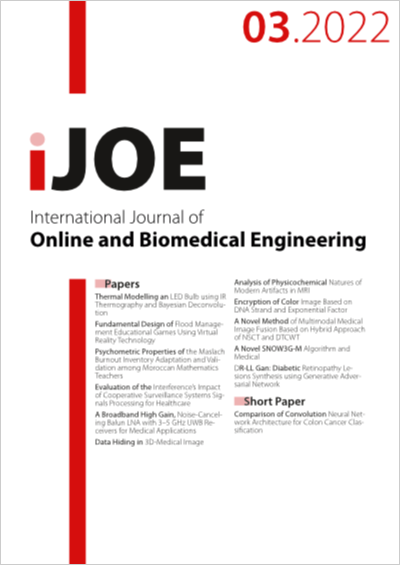Evaluation of the Interference’s Impact of Cooperative Surveillance Systems Signals Processing for Healthcare
DOI:
https://doi.org/10.3991/ijoe.v18i03.28015Keywords:
— Signal for Healthcare, Surveillance Systems, Impulse interferencesAbstract
Patient signals produced from a physical device, such as electrocardiography (ECG), which records the electrical activity of the heart, are vulnerable to keep noise due to various physical constraints of acquisition devices. It is critical for the detection and diagnosis of a variety of diseases. An ECG signal should be displayed as clean and clear as feasible due to its relevance in assisting physicians and doctors in making appropriate judgments. ECG is vulnerable to many types of noise because it is an electrical signal. To improve the quality of assistance for consumers Info a surveillance system by cooperative surveillance systems, high-quality data processing by the observed surveillance systems is required, which predetermines the requirement for high noise immunity of the latter. At the same time, the basics of building cooperative surveillance systems as a network of two-channel asynchronous information communication systems which include numeral of transmitting and receiving process using diverse frequency limits for reception and transmission, failure-prone open single-channel queuing systems, and request signals do not allow to provide the required the noise resistance of the systems under consideration. This paper first gives a characterization of request and interference signal flows in cooperative surveillance systems and briefly examines the features of request signals and their effect on the immunity of cooperative surveillance systems. Then, it calculates the noise resistance of the demand signals of the cooperative surveillance systems for the probabilities of errors: signal skipping; First- and second-degree false alarms in the case of unrelated events, unintended and intra-system impulse interferences in the request channel
Downloads
Published
How to Cite
Issue
Section
License
Copyright (c) 2022 Mohammad K. Abdul-Hussein, Haider Th.Salim Alrikabi, Ivan Obod, Iryna Svyd, Oleksii Strelnytskyi

This work is licensed under a Creative Commons Attribution 4.0 International License.


